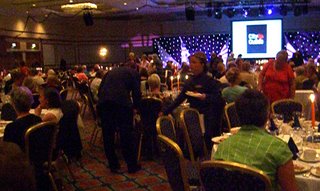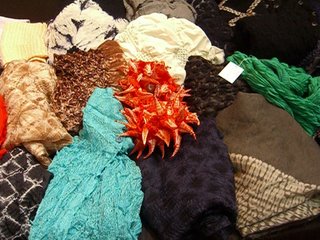 But the after-dinner speaker was Michael James, and he said four things:
But the after-dinner speaker was Michael James, and he said four things:1. Learn to draw and use sketchbooks
2. Don't feed only at the quilt trough. Other arts offer a rich smorgasbord
3. something about working at the right scale, and giving the work room to breathe
4. Use your eyes.
Among his slides was one of Mbuti bark cloth (my quilt was based on an Mbuti bark cloth!); he commented: If you're interested in line, look at these drawings on bark cloth from the Congo.
Michael James was one of the speakers at the symposium, Why Quilts?, that ran alongside the Festival of Quilts, in the mornings (people who attended the symposium said it was a real eye-opener). His lecture the next day was sold out, but others were interesting.
Diana Harrison spoke about her wholecloth quilts, her career, influences - and collections, which include squashed tin cans, disintegrating lost footballs, and old shoes she finds on her walks over Wandsworth Common. She started out spray painting with disperse dyes, masking and remasking the fabric, has moved on to splattering and flicking dye mixed with flour and water, which acts as a resist for the next layer, and now works in a different way, using a discharge paste she mixes fresh each time. She stitches backwards and forwards across the quilts to avoid having to darn in the thread ends. Her main inspiration is architecture but the titles of her pieces show a certain influence of life events.
 Her show within the show had pieces of various sizes, in her characteristic muted colours.
Her show within the show had pieces of various sizes, in her characteristic muted colours.
Yoshiko Wada, author of Memory on Cloth, defined the process of shibori as manipulating a two-dimensional plane into three dimensions, compressing it and dyeing it - when you open it up, it reveals the pattern and the pattern is a record of the process. She showed slides of how various designers (Issey Miyake, Yoshiki Hishinuma, Yohji Yamamoto, Hiroko Koshino) had used this process in their collections, and of artists who used it.
 And she passed samples around; the next day they were heaped up in her booth.
And she passed samples around; the next day they were heaped up in her booth.
oh,Margaret, you're so lucky to be able to attend the f of q !
ReplyDelete